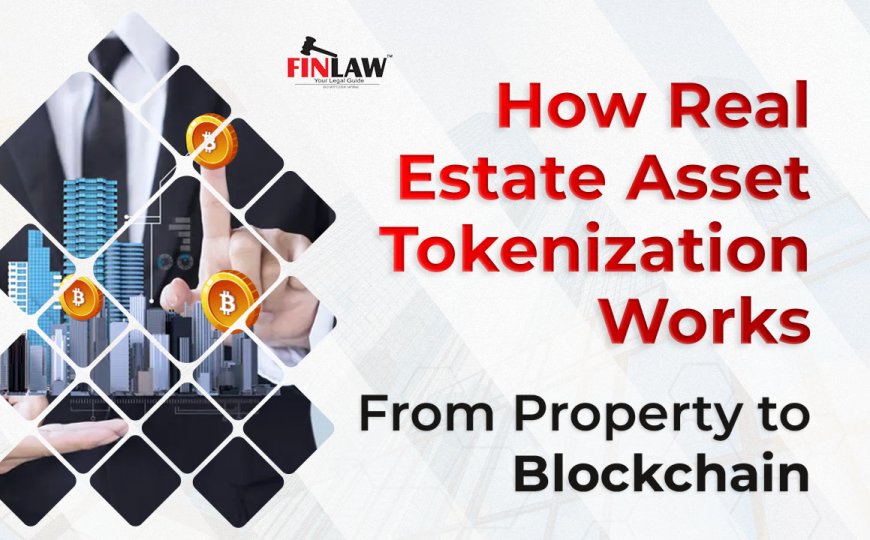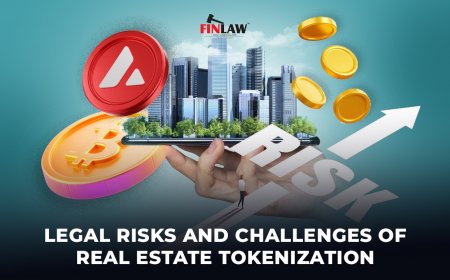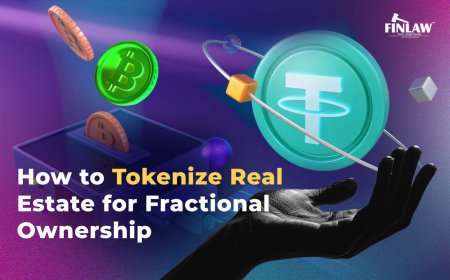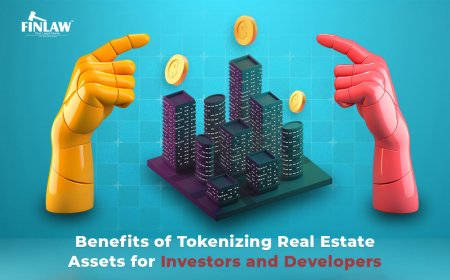How Real Estate Asset Tokenization Works: From Property to Blockchain
Learn how real estate asset tokenization works — from property selection to blockchain. Explore benefits, risks, India’s regulatory landscape, and investor checklists.

Introduction
Real estate has long been considered a stable investment class, but challenges such as high capital requirements, illiquidity, and complex ownership structures limit accessibility. Traditionally, owning a share in premium real estate like commercial towers, luxury apartments, or logistics parks has been restricted to large investors and institutions.
Enter real estate asset tokenization — the process of converting ownership rights or income streams of a property into digital tokens on a blockchain. Each token represents a fractional share, enabling smaller investors to participate in markets that were previously inaccessible.
In India, tokenization of real estate assets is gaining attention as regulatory sandboxes, pilot projects, and fintech innovation converge. While widespread adoption is still emerging, the potential to revolutionize property investment and capital raising is undeniable.
What is Real Estate Asset Tokenization?
Real estate asset tokenization is the creation of blockchain-based digital tokens that represent rights in a physical property or a vehicle holding the property. These tokens can be traded, transferred, or used to automate income distribution.
Key Features of Tokenization of Real Estate Assets:
-
Fractional Ownership: Splits high-value assets into smaller investment units.
-
Programmable Rights: Smart contracts automate rent collection, dividend payouts, or governance votes.
-
Immutable Records: Blockchain ensures transparency and tamper-proof ownership records.
-
Global Reach: Cross-border investors can participate (subject to regulation).
Example: A ₹100 crore commercial building can be divided into 1 million tokens worth ₹100 each. Retail investors can now own a portion of the property for just ₹10,000.
Why Real Estate Asset Tokenization Matters in India
India’s real estate market is valued at over $477 billion (2025 estimate) and projected to reach $1 trillion by 2030. Despite this, access is largely restricted due to high ticket sizes and opaque structures.
Tokenization of real estate assets in India offers:
-
Democratization of Investment: Allowing middle-class investors access to premium commercial or residential properties.
-
Alternative Financing for Developers: Tokenized offerings can raise capital more efficiently than traditional debt or equity.
-
Enhanced Liquidity: Real estate, traditionally illiquid, gains a secondary market through token exchanges.
-
Alignment with India’s Digital Push: Fits well with government-led initiatives like Digital India and land record digitization.
How Real Estate Asset Tokenization Works: Step-by-Step
Step 1: Asset Identification & Legal Structuring
-
Select a suitable property (commercial towers, student housing, co-working spaces).
-
Form an SPV or trust that legally owns the property.
-
Tokens represent shares or economic claims against this vehicle.
Step 2: Valuation & Tokenomics
-
Independent property valuation.
-
Decide on token supply, price, and structure:
-
Income tokens: backed by rental cash flows.
-
Equity tokens: represent ownership.
-
Hybrid tokens: combine both.
Step 3: Compliance & Documentation
-
Draft offering memorandum, subscription agreements, and disclosures.
-
Apply KYC/AML for all investors.
-
In India, offerings may need to comply with SEBI regulations and FEMA for foreign investors.
Step 4: Blockchain & Token Standards
-
Choose platform (Ethereum, Polygon, Hyperledger).
-
Select token standard:
-
ERC-20 (simple fungible tokens)
-
ERC-721/1155 (NFT or hybrid models)
-
ERC-1400 (security tokens with compliance features)
Step 5: Token Issuance & Sale
-
Tokens are minted and issued to investors after fund subscription.
-
Funds flow to the SPV for property acquisition or management.
Step 6: Secondary Market Trading
-
Tokens may be listed on regulated exchanges or private marketplaces.
-
Investors can sell tokens without selling the entire property.
Step 7: Asset Management & Distributions
-
Property managers handle maintenance.
-
Smart contracts automate rental income distribution, voting, and reporting.
Case Study: Tokenization in India
One of India’s first regulated tokenized real estate offerings was Oryx, launched in GIFT City by Terazo in collaboration with Tokeny. The project created a compliant pathway for tokenized commercial property using sandbox approvals.
This demonstrates how India is cautiously experimenting with real estate tokenization, focusing on regulated environments before broader adoption.
Regulatory Landscape in India
Current Legal Position
-
No dedicated law for tokenization of real estate assets.
-
IFSCA (GIFT City) has introduced regulatory sandboxes for pilot projects.
-
SEBI may classify property tokens with investment rights as securities.
-
FEMA applies for cross-border investments.
-
Taxation: GST, capital gains, and income tax implications remain complex.
Outlook
India is likely to adopt gradual, sandbox-based frameworks before enacting nationwide laws. Developers and fintech startups are advised to launch under regulated zones like GIFT City.
Benefits of Real Estate Asset Tokenization
-
Accessibility: Lowers entry barriers for retail investors.
-
Transparency: Blockchain ensures audit trails and ownership clarity.
-
Liquidity: Secondary trading enables faster exits.
-
Automation: Reduces operational overhead with smart contracts.
-
Diversification: Investors can hold fractional stakes across multiple assets.
Challenges and Risks
-
Regulatory Uncertainty in India — absence of uniform rules creates risk.
-
Liquidity Limitations — tokens may not find enough buyers or platforms.
-
Operational Risks — legal linkage between token and title deed must be strong.
-
Technology Risks — smart contract bugs, custody risks, and key mismanagement.
-
Market Risks — token value tied to real estate fundamentals and cycles.
Global Examples of Tokenized Real Estate
-
St. Regis Aspen Resort (USA): Tokenized through a security token offering.
-
BrickMark (Switzerland): Tokenized $134 million commercial property.
-
REINNO (USA): Tokenized debt and equity real estate investments.
These examples highlight how real estate asset tokenization is already mainstream globally, with India catching up through pilot projects.
Investor Checklist Before Participating
-
Confirm SPV or trust structure is in place.
-
Verify legal compliance and regulatory approvals.
-
Check property valuation and title verification.
-
Review tokenomics: rights, fees, dividends, lock-ups.
-
Ensure audits (financial and smart contract) are conducted.
-
Understand tax treatment: GST, income tax, capital gains.
-
Assess liquidity options and exit mechanisms.
Developer & Sponsor Checklist
-
Partner with law firms experienced in real estate and securities law.
-
Use compliance-friendly token standards (ERC-1400).
-
Launch within regulatory sandboxes (GIFT City).
-
Maintain AML/KYC processes.
-
Ensure independent audits and investor transparency.
Frequently Asked Questions (FAQs)
Q1. Is real estate asset tokenization legal in India?
Currently, there is no nationwide law. Projects are being piloted under IFSCA (GIFT City) with sandbox approvals. Tokens may be treated as securities under SEBI regulations.
Q2. How is tokenization of real estate assets different from REITs?
-
REITs are listed investment trusts regulated by SEBI.
-
Tokenization creates fractional ownership via blockchain tokens, offering faster settlement, global access, and programmable rights.
Q3. Can retail investors participate?
Yes, but only in compliant offerings. Some projects may restrict participation to accredited investors.
Q4. How are tokenized assets taxed in India?
Taxation depends on structure — rental income may attract income tax, while token sales may trigger capital gains. GST may apply to certain transactions.
Q5. What types of real estate are best suited for tokenization?
Commercial properties, student housing, logistics parks, and co-working spaces are considered ideal due to stable income streams.
The Future of Real Estate Tokenization in India
Tokenization is expected to grow significantly in India due to:
-
Digital India initiatives digitizing land records.
-
Growing fintech adoption among younger investors.
-
Need for alternative financing among developers.
-
Global capital flows seeking exposure to Indian real estate.
While tokenization of real estate assets will not replace traditional property transactions overnight, it will increasingly serve as a parallel investment mechanism — starting in niche markets and expanding with regulatory clarity.
Conclusion
Real estate asset tokenization is set to transform property investment in India by enabling fractional ownership, enhancing liquidity, and automating operations. While challenges like regulatory uncertainty and market adoption remain, pilot projects in GIFT City showcase the potential for large-scale adoption.
For investors, tokenization offers access to premium real estate with lower entry costs. For developers, it provides innovative financing solutions. As India develops clearer regulations, tokenization of real estate assets will become a vital part of the real estate investment landscape.
What's Your Reaction?



















